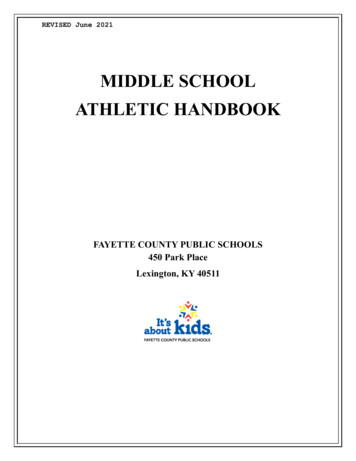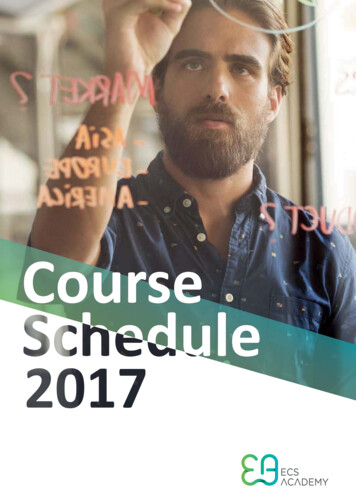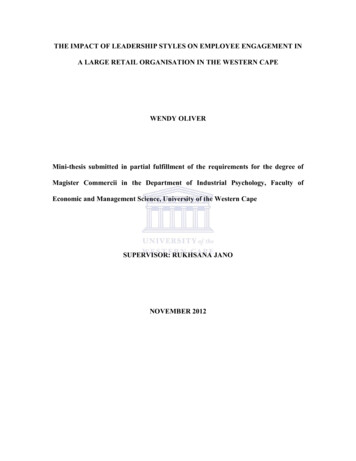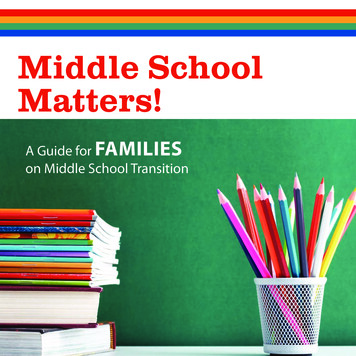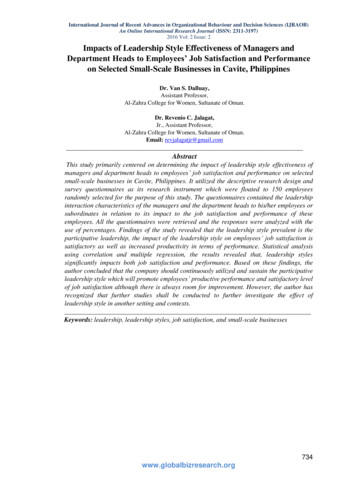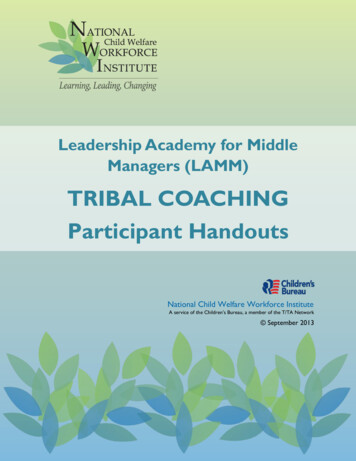
Transcription
Leadership Academy for MiddleManagers (LAMM)TRIBAL COACHINGParticipant HandoutsNational Child Welfare Workforce InstituteA service of the Children’s Bureau, a member of the T/TA Network September 2013
AcknowledgementsThis publication represents a collaborative effort by the partners of the National ChildWelfare Workforce Institute (NCWWI): University at Albany/SUNY, University of Denver,Fordham University, University of Iowa, University of Maryland, Michigan StateUniversity, University of Michigan, Portland State University, and University of SouthernMaine. Thanks to Nichole Culley and Michelle Zhao for their editorial support. Specialthanks to Mary Wolf, MSW, for her guidance and edits.NCWWI is funded through a cooperative agreement with U.S. Department of Health andHuman Services, Administration for Children and Families, Children’s Bureau, Award No.90CT0145. Special thanks to Randi Walters, Children’s Bureau Project Officer, and toRobert Lindecamp, Child Welfare Program Specialist (CB/ICF), for their support.Principal AuthorsNancy S. Dickinson, PhD, National Child Welfare Workforce Institute, Project Director,University of MarylandWilliam Wolf, MA, MPA, Leadership Academy for Middle Managers, Tribal Consultant,Portland State UniversityDeborah M. Reed, MSW, Leadership Academy for Middle Managers, Project Manager,Portland State UniversityRecommended CitationNational Child Welfare Workforce Institute. (2013). LAMM tribal coaching participanthandouts. Albany, NY: Author.For More InformationVisit the NCWWI website at www.ncwwi.org. 2013 National Child Welfare Workforce Institute, University at Albany, Albany, NY.This document may be reproduced in whole or part without restriction as long as theNational Child Welfare Workforce Institute is credited for the work. Upon request, thecontents of this document will be made available in alternate formats to serve accessibilityneeds of persons with disabilities.The contents of this document are solely the responsibility of the National Child WelfareWorkforce Institute and do not necessarily represent the official views of the Children’sBureau.National Child Welfare Workforce Institutewww.ncwwi.orgA service of the Children’s Bureau, a member of the T/TA Network September 20132
Schedule at a GlanceFacilitator and Coach Prework: Sunday (3:00 p.m. – 7:30 p.m.)Facilitators and Coaches Meeting: Review Agenda, Discuss Roles andResponsibilities; Talking Circle . 3:00 – 5:30 p.m.Welcome Participants, Introductions, and Dinner . 6:00 – 7:30 p.m.Day 1: Monday (8:30 a.m. – 5:00 p.m.)Breakfast . 7:30 – 8:30 a.m.Welcome and Overview of Training . 8:30 – 9:00 a.m.Personal Story of Leading a Change Initiative, Part 1 . 9:00 – 10:00 a.m.Break. 10:00 – 10:15 a.m.Personal Story of Leading a Change Initiative, Part 2 . 10:15 – 11:00 a.m.Review of NCWWI Leadership Model and Tribal Perspective toCreate Change . 11:00 a.m. – noonLunch .noon – 1:00 p.m.World Café Discussion.1:00 – 2:30 p.m.Break.2:45 – 3:00 p.m.Icebreaker .3:00 – 3:05 p.m.World Café Discussion (continued) . 3:05 – 4:00 p.m.Large-Group Discussion .4:00 – 4:15 p.m.Personal Journals .4:15 – 4:45 p.m.One-Word Debrief and Adjourn . 4:45 – 5:00 p.m.Day 2: Tuesday (8:30 a.m. – 5:00 p.m.)Breakfast .7:30 – 8:30 a.m.Reflections and Review of the Day . 8:30 – 8:45 a.m.Adaptive Leadership in Tribal Child Welfare . 8:45 – 9:15 a.m.Adaptive Leadership: Small-Group Coaching . 9:15 – 10:15 a.m.Break. 10:15 – 10:30 a.m.Addressing Challenges . 10:30 – 11:45 a.m.Lunch . 11:45 a.m. – 12:45 p.m.Trauma and Leadership . 12:45 – 1:30 p.m.National Child Welfare Workforce Institutewww.ncwwi.orgA service of the Children’s Bureau, a member of the T/TA Network September 20133
Strategies for Change .1:30 – 1:45 p.m.Talking Circle .1:45 – 2:45 p.m.Break.2:45 – 3:00 p.m.Ice Breaker .3:00 – 3:05 p.m.NCWII Leadership Principles . 3:05 – 4:15 p.m.Personal Journals .4:15 – 4:45 p.m.One-Word Debrief and Adjourn . 4:45 – 5:00 p.m.Day 3: Wednesday (8:30 a.m. – 3:30 p.m.)Breakfast . 7:30 – 8:30 a.m.Agenda and Objectives; Reflections and Review of Previous Day. 8:30 – 8:45 a.m.Leading for Sustainable Systems Change . 8:45 – 10:00 a.m.Break. 10:00 – 10:15 a.m.Change Initiative Revisions . 10:15 – 11:00 a.m.Culturally Responsive Logic Model. 11:00 a.m. – noonLunch .noon – 1:00 p.m.Change Initiative Action Plans . 1:00 – 2:15 p.m.Parking Lot .2:15 – 2:20 p.m.Evaluation .2:20 – 2:30 p.m.Closing the Circle .2:30 – 3:30 p.m.Adjourn . 3:30 p.m.National Child Welfare Workforce Institutewww.ncwwi.orgA service of the Children’s Bureau, a member of the T/TA Network September 20134
The Four AgreementsDon Miguel RuizBe Impeccable With Your WordSpeak with integrity. Say only what you mean. Avoid using the word to speak againstyourself or to gossip about others. Use the power of your word in the direction of truth andlove.Don’t Take Anything PersonallyNothing others do is because of you. What others say and do is a projection of their ownreality, their own dream. When you are immune to the opinions and actions of others, youwon’t be the victim of needless suffering.Don’t Make AssumptionsFind the courage to ask questions and to express what you really want. Communicate withothers as clearly as you can to avoid misunderstandings, sadness, and drama. With justthis one agreement, you can completely transform your life.Always Do Your BestYour best is going to change from moment to moment; it will be different when you arehealthy as opposed to sick. Under any circumstance, simply do your best, and you will avoidself-judgment, self-abuse, and regret.National Child Welfare Workforce Institutewww.ncwwi.orgA service of the Children’s Bureau, a member of the T/TA Network September 20135
Principles of Consultation1.Respect each participant and appreciate each other’s diversity. This is the primerequisite for consultation.2.Value and consider all contributions. Belittle no one. Withhold evaluation untilsufficient information has been gathered.3.Contribute and express opinions with complete freedom.4.Carefully consider the views of others—if a valid point of view has been offered, acceptit as your own.5.Keep to the mission at hand. Extraneous conversation may be important to teambuilding, but it is not solution-driven consultation.6.Share in the group’s unified purpose: a desire for success of the mission.7.Expect the truth to emerge from the clash of differing opinions; optimum solutionsemerge from diversity of opinion.8.Once stated, let go of opinions. Rather than “defend” your position, let it go.Ownership causes disharmony within the team and almost always gets in the way offinding the truth.9.Contribute to maintaining a friendly atmosphere by speaking with courtesy, dignity,care, and moderation. This will promote unity and openness.10.Seek consensus. But if consensus is impossible, let the majority rule. Remember thata decision, once made, becomes the decision of every participant. After the group hasdecided, dissenting opinions are destructive to the success of the mission. Whendecisions are undertaken with total group support, wrong decisions can be more fullyobserved and corrected.National Child Welfare Workforce Institutewww.ncwwi.orgA service of the Children’s Bureau, a member of the T/TA Network September 20136
Steps for Taking Unified ActionAdapted From Four Worlds International Institute1.Define the problem clearly. Make sure everyone has the same understanding of whatis being discussed. It may help to display the question or issue in writing for all to see.2.Identify the human values or spiritual principles related to the issue. Think about thevalues and principles that should be part of the solution and how violating thosevalues and principles has contributed to the problem.3.Gather information that might help you make a good decision. This information maybe held as common knowledge by the group members and merely needs to be madeexplicit; or you may need to consult relevant literature or talk to experts and laypeople. Don’t try to make a decision or evaluate the information while you aregathering it.4.Make sure everyone in the group understands all of the gathered information.5.Give everyone the opportunity to express their opinion about what should be done,based on the guiding principles you have identified. Let everyone have a chance tospeak once before anyone speaks twice.6.Avoid taking offence at someone else’s point of view. The clash of differing points ofview is what produces creative solutions. In the same spirit, avoid speaking in waysthat may be offensive to others.7.Don’t hold on to your point of view. Once it has been given to the circle, it doesn’tbelong to you anymore. You don’t have to keep defending it.8.After all the participants have contributed their ideas, the facilitator (or anothergroup member) should synthesize what has been said into a course of action thateveryone can agree on.9.Anyone who feels that an important point has not been taken into consideration inthis synthesis should be given a chance to speak again.10.Repeat steps 5 through 9 until a consensus is reached. If it becomes evident that avital piece of information is lacking, be sure to get it before proceeding.11.If you can’t reach total consensus, use a majority vote as a last resort.12.Once you have reached a decision, it is important for everyone to support itwholeheartedly even if you are not in full agreement. Through this type of unitedaction, any flaws in the plan will be revealed and can be remedied without hardfeelings or conflict.National Child Welfare Workforce Institutewww.ncwwi.orgA service of the Children’s Bureau, a member of the T/TA Network September 20137
From the Elders of the Hopi NationOraibi, ArizonaJune 8, 2000To My Fellow Swimmers:Here is a river flowing now very fast. It is so great and swift that there arethose who will be afraid, who will try to hold on to the shore. They are beingtorn apart and will suffer greatly.Know that the river has its destination. The elders say we must let go of theshore. Push off into the middle of the river, and keep our heads above water.And I say see who is there with you and celebrate. At this time in history, weare to take nothing personally, least of all ourselves, for the moment we do,our spiritual growth and journey come to a halt.The time of the lone wolf is over. Gather yourselves. Banish the word strugglefrom your attitude and vocabulary.All that we do now must be done in a sacred manner and in celebration. Forwe are the ones we have been waiting for.National Child Welfare Workforce Institutewww.ncwwi.orgA service of the Children’s Bureau, a member of the T/TA Network September 20138
ResourcesNCAI Policy Research Center and MSU Center for Native Health Partnerships.(2012). Walk softly and listen carefully: Building research relationships withtribal communities. Washington, DC & Bozeman, MT: Authors. yPaper G NCAI-WalkSoftly.pdfBartgis, J. (2010). Native American worldview and development of a culturallyrelevant logic model. Tulsa, OK: Indian Health Care Resource Center ofTulsa. Retrieved %20Culturally%20Relevant%20LM.pdfNational Child Welfare Workforce Institutewww.ncwwi.orgA service of the Children’s Bureau, a member of the T/TA Network September 20139
TRIBAL COACHING Participant Handouts . National Child Welfare Workforce Institute A service of the Children's Bureau, a member of the T/TA Network . Adaptive Leadership in Tribal Child Welfare . 8:45 - 9:15 a.m. Adaptive Leadership: Small- Group Coaching . 9:15 - 10:15 a.m. .

